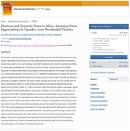| dc.contributor.author | Kanyamurwa, John Mary | |
| dc.contributor.author | Kakuba, Juma Sultan | |
| dc.contributor.author | Kaddu, Ronald | |
| dc.contributor.author | Babalanda, Stanely | |
| dc.date.accessioned | 2023-03-23T07:16:49Z | |
| dc.date.available | 2023-03-23T07:16:49Z | |
| dc.date.issued | 2022-11 | |
| dc.identifier.citation | Kanyamurwa, J.M., Kakuba, J.S., Kaddu, R., Babalanda, S. (2022). Elections and Domestic Peace in Africa: Assessing Peace Opportunities in Uganda’s 2021 Presidential Election. In: Muzee, H., Sunjo, T.E., Enaifoghe, A.O. (eds) Democracy and Africanness. Advances in African Economic, Social and Political Development. Springer, Cham. https://doi.org/10.1007/978-3-031-11248-5_11 | en_US |
| dc.identifier.uri | https://doi.org/10.1007/978-3-031-11248-5_11 | |
| dc.identifier.uri | https://hdl.handle.net/20.500.12504/1270 | |
| dc.description.abstract | Substantial narratives have in recent years been woven around the role of electoral democracy, widely welcoming it as a symbol of Africa’s advancement towards nonviolent power transfer and political stability. Yet, such analyses have often overlooked the unswerving electoral effects on critical peace perspectives in individual African countries. Contributing to the broader discourse on electoral democracy and peaceful democratic upshots, this chapter uses Uganda’s 2021 presidential election, held under COVID-19 pandemic regulations, to assess the domestic peace prospects attendant to electoral democracy as per current studies. Accordingly, adopting exploratory qualitative methods, the paper makes several arguments. First, the introduction of major constitutional reforms which centrally provided for competitive electoral democracy starting from the early 1980s, on which the January 2021 presidential election was based, paved the foundations for domestic peace in the country. Secondly, in line with the study results, we maintain that the 2021 presidential election processes fundamentally undermined domestic peace opportunities. This perspective was particularly reinforced by the experiences of violence leading to unfortunate civilian deaths, abductions and citizen incarcerations following the short-lived arrest of one of the presidential candidates during the presidential campaign in late 2020. Third, the results underscored a perspective on how key electoral and state security institutions detrimentally shaped the 2021 presidential election, inauspiciously contributing to events that further progressively eroded domestic peace. For more enduring and even-handed domestic peace in the country, the paper recommends profound constitutional reforms focusing on checks and balances, more inclusive electoral laws and security reforms aimed at boosting domestic peace in the context of electoral democracy. | en_US |
| dc.language.iso | en | en_US |
| dc.publisher | Springer International Publishing | en_US |
| dc.subject | Elections | en_US |
| dc.subject | Domestic peace | en_US |
| dc.subject | Peace opportunities | en_US |
| dc.subject | Uganda | en_US |
| dc.subject | Africa | en_US |
| dc.title | Elections and domestic peace in Africa: assessing peace opportunities in Uganda’s 2021 presidential election | en_US |
| dc.type | Book chapter | en_US |

